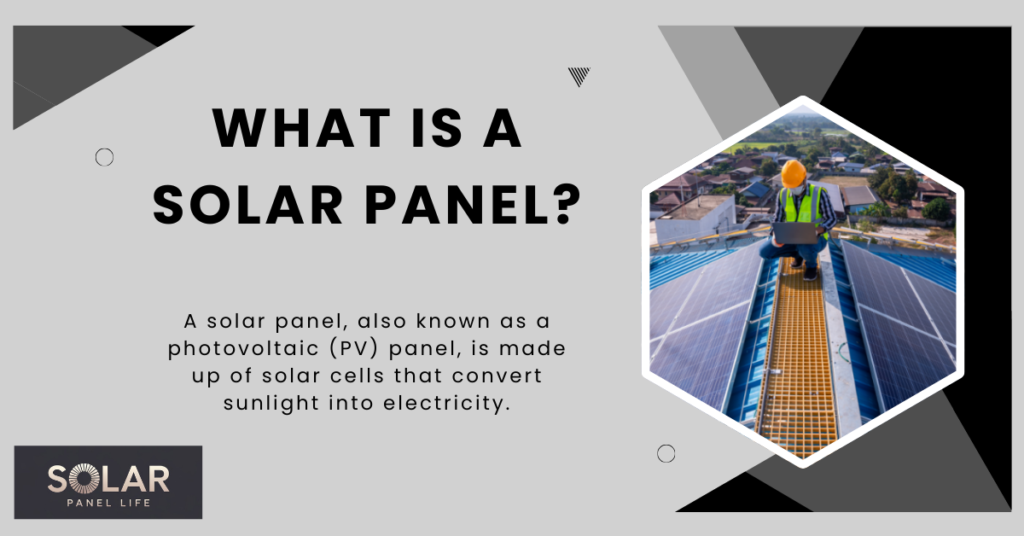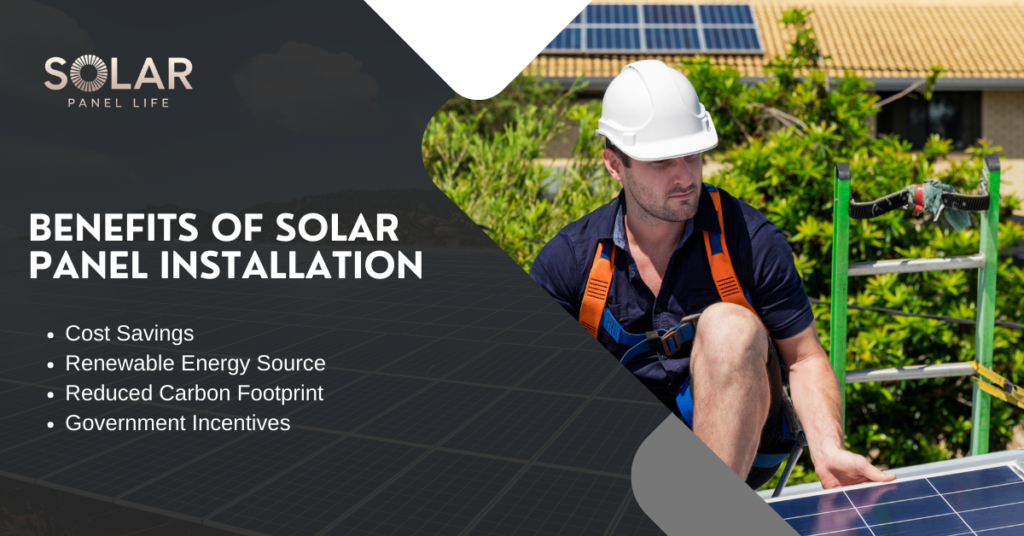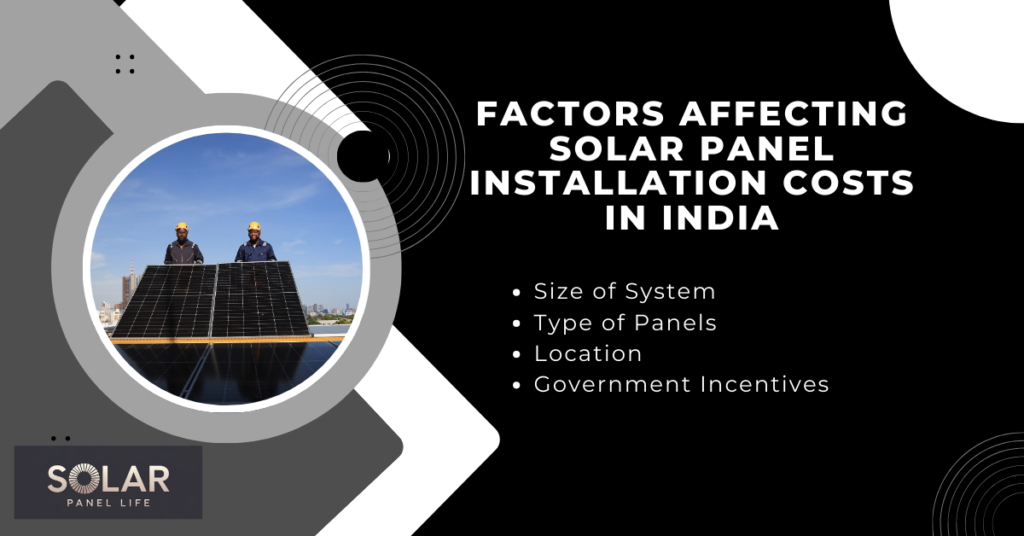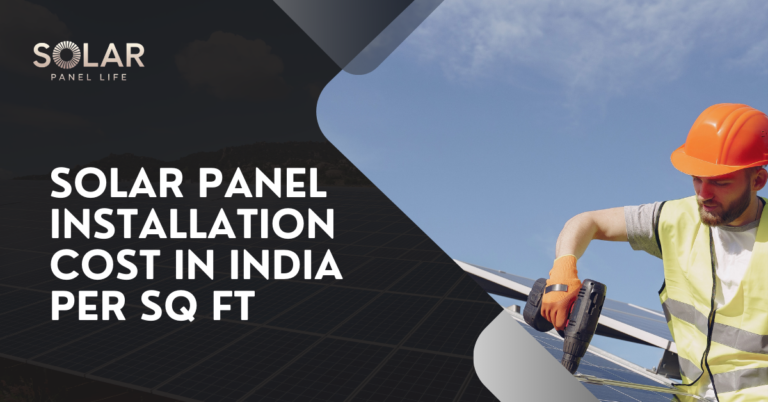Solar panels have become a popular choice for generating clean and renewable energy in India. With the increasing awareness about environmental concerns and the need for sustainable living, more and more people are turning to solar energy to power their homes and businesses. However, one of the major factors that deter people from installing solar panels is the cost.
In this article, we will take a detailed look at the solar panel installation cost in India per sq ft and understand the factors that affect it. We will also discuss some ways to reduce the cost of solar panel installation and make it more affordable for everyone.
What is Solar Panel Installation?
Solar panel installation refers to the process of setting up solar panels on a rooftop or ground-mounted structure to generate electricity from the sun’s rays. The solar panels consist of photovoltaic (PV) cells that convert sunlight into direct current (DC) electricity, which is then converted into alternating current (AC) electricity by an inverter.
This electricity can be used to power homes, businesses, and other establishments.
The installation of solar panels involves several steps, including site evaluation, design, obtaining necessary permits, mounting the panels, wiring and connecting them to the electrical system, and testing for efficiency. It is a complex process that requires professional expertise and specialized equipment.

Benefits of Solar Panel Installation
There are numerous benefits of installing solar panels in India per sq ft, making it a worthwhile investment for households and businesses. Let us take a closer look at some of these benefits:
1. Cost Savings
One of the primary benefits of solar panel installation is the cost savings it offers in the long run. By generating your electricity, you can significantly reduce or even eliminate your monthly electricity bills. With the rising costs of traditional sources of energy, switching to solar energy can result in substantial savings over time.
2. Renewable Energy Source
Solar energy is a renewable resource, meaning it will never run out. Unlike fossil fuels that are depleting rapidly, solar panels use sunlight to generate electricity, which is an unlimited resource. By using solar energy, we can reduce our dependence on traditional sources of energy and contribute towards a more sustainable future.

3. Reduced Carbon Footprint
Solar energy is a clean and green source of energy that does not emit harmful greenhouse gases into the atmosphere. By using solar panels, we can significantly reduce our carbon footprint and help combat climate change. This is especially crucial for India, which has one of the highest carbon footprints in the world.
4. Government Incentives
The Indian government offers various incentives and subsidies for installing solar panels, making it an even more attractive investment. These incentives can significantly reduce the initial cost of installation, making it a more accessible option for households and businesses.
5. Increase in Property Value
Installing solar panels can also increase the value of your property. As more and more people are becoming environmentally conscious, having a solar panel system in place can make your property more attractive to potential buyers. This can result in a higher resale value for your property.
6. Low Maintenance Costs
Solar panels require very little maintenance, making them a cost-effective option in the long run. With no moving parts and a lifespan of 25 to 30 years, solar panels only require occasional cleaning and inspections.

Factors Affecting Solar Panel Installation Cost
The cost of solar panel installation in India can vary depending on various factors such as the size of the solar system, type of panel used, location, and installation charges. Let’s discuss these factors in detail.
1. Size of Solar System
Solar panel systems come in different sizes and capacities to meet the energy needs of different households and businesses. The cost of installation is directly proportional to the size or capacity of the system. A larger system will require more panels, which will increase the overall cost of installation.
2. Type of Panel Used
Another factor that affects the cost of solar panel installation is the type of panel used. There are three main types of solar panels available in India – monocrystalline, polycrystalline, and thin-film. Monocrystalline panels are the most efficient and also the most expensive, while polycrystalline panels are more affordable but slightly less efficient. Thin-film panels are the least expensive but also have lower efficiency. The type of panel chosen for installation will directly impact the cost.
3. Location
The location where the solar panels will be installed plays a significant role in determining the cost. The amount of sunlight received in a particular region, local regulations and policies, and accessibility to the site can all affect the installation cost. For instance, areas with high levels of sunlight will require fewer panels to generate the same amount of energy, thus reducing the overall cost.
4. Installation Charges
Apart from the cost of solar panels and related equipment, there are also installation charges that need to be considered. These charges may vary depending on the complexity of the installation, the type of roof, and other factors. It is essential to choose a reputable and experienced installer to ensure proper and efficient installation.
5. Quality of Panels and Equipment
The quality of solar panels and other equipment used in the installation also plays a crucial role in determining the cost. Higher quality panels may come at a higher price, but they are more efficient and have a longer lifespan, thus providing better value for money in the long run.
6. Subsidies and Incentives
In recent years, the Indian government has introduced various subsidies and incentives to promote the adoption of solar energy. These can significantly reduce the cost of installation for individuals and businesses. However, these schemes may have certain eligibility criteria and may vary from state to state.
7. Maintenance Costs
While solar panels require minimal maintenance, they still need occasional cleaning and servicing to ensure optimal performance. The cost of maintenance should also be considered when calculating the overall cost of installation.
8. Financing Options
The upfront cost of solar panel installation may seem high to many, but there are various financing options available that can make it more affordable. Some banks and financial institutions offer loans specifically for solar projects, with attractive interest rates and flexible repayment options.
Solar Panel Installation Cost in India per sq ft
The cost of solar panel installation in India per sq ft can range from Rs. 250 to Rs. 350, depending on the factors mentioned above. For a small residential system of 1 kW capacity, the cost can be around Rs. 90,000 to Rs. 1,30,000, while for a larger system of 10 kW capacity, it can go up to Rs. 9 lakhs to Rs. 13 lakhs. However, these are just estimates, and the cost may vary depending on the location and other factors.
Average Cost of Solar Panel Installation
The average cost of installing a solar panel system in India per sq ft ranges from Rs. 70 to Rs. 100, depending on the location and type of panels used. For a standard 3kW system, the total cost can range from Rs. 1,50,000 to Rs. 2,50,000. This cost includes the panels, installation, and necessary equipment.
Cost Breakdown of Solar Panel Installation
To better understand the cost breakdown of installing solar panels in India per sq ft, let us look at an example:
Assuming you live in New Delhi and want to install a 3kW system on a sloped roof using monocrystalline panels, here is how the cost breaks down:
- Solar panels: The cost of solar panels can vary from Rs. 30 to Rs. 50 per watt, depending on the type and brand. For a 3kW system, this would amount to approximately Rs. 90,000 to Rs. 1,50,000.
- Installation charges: The installation cost can range from Rs. 10 to Rs. 20 per watt, totaling around Rs. 30,000 to Rs. 60,000 for a 3kW system.
- Inverters and other equipment: Inverters are essential components of a solar panel system and can cost anywhere from Rs. 25,000 to Rs. 60,000 for a 3kW system.
- Mounting and wiring: The cost of mounting and wiring the solar panels can vary from Rs. 10 to Rs. 15 per watt, totaling around Rs. 30,000 to Rs. 45,000 for a 3kW system.
- Permits and inspection fees: You may need to obtain permits and pay inspection fees, which can add up to approximately Rs. 10,000.
- Additional costs: Additional equipment such as batteries or energy monitoring systems can also increase the installation cost.
Return on Investment (ROI)
While the initial cost of solar panel installation may seem high, it is essential to consider the long-term benefits and return on investment. Installing a solar panel system can result in significant savings on electricity bills, with some households even reporting zero electricity bills after installing solar panels.
The return on investment for a residential solar panel system in India is typically between 3 to 5 years. This means that the cost of installation can be recovered in savings through lower electricity bills within this time frame. Moreover, solar panels have a lifespan of 25 to 30 years, making them a valuable long-term investment.
Ways to Reduce Solar Panel Installation Cost
While the initial cost of solar panel installation may seem high, it is a long-term investment that can pay off in terms of energy savings and reduced electricity bills. However, if you want to reduce the upfront cost of installation, here are some ways to do it:
1. Avail Government Subsidies and Incentives
The Indian government offers various subsidies and incentives for individuals and businesses to encourage the adoption of solar energy. These can significantly reduce the cost of solar panel installation. For example, under the Solar Rooftop Program, homeowners can avail a subsidy of 30% on the cost of installation.
2. Opt for Net Metering
Net metering is a system where the excess electricity generated by solar panels can be fed back into the grid, and you will receive credits for it. This can significantly reduce your electricity bills, making it a more affordable option in the long run.
3. Choose Affordable Panels
As discussed earlier, the type of panel chosen for installation can affect the cost. Opting for affordable yet efficient panels can help reduce the upfront cost without compromising on performance.
4. Consider Leasing or Financing Options
If you do not have enough funds to cover the entire cost of installation, you can consider leasing or financing options. Many solar companies offer these options, making solar panel installation more affordable and accessible for everyone.
5. Do-It-Yourself (DIY) Installation
If you have the necessary skills and knowledge, you can opt for a DIY installation instead of hiring a professional installer. This can significantly reduce the installation charges and overall cost.
6. Optimize Energy Consumption
Before installing solar panels, it is essential to evaluate your energy consumption and find ways to reduce it. This can help you determine the right size of the solar system needed, thus reducing the cost.
7. Compare Installers
When choosing an installer, make sure to compare prices and services offered by different companies. This can help you get a better deal and save on installation charges.
8. Regular Maintenance
Proper and regular maintenance of solar panels can help prevent any expensive repairs or replacements in the future. It is recommended to clean the panels regularly and schedule annual servicing to ensure optimal performance and longevity, thus reducing long-term costs.
Way Forward
Solar panels offer a sustainable and cost-effective solution to meet our energy needs. However, the initial investment may seem daunting to some. By understanding the factors that affect the installation cost and exploring ways to reduce it, we can make solar energy more accessible for everyone in India.
With the government’s support and the increasing adoption of solar energy, we can create a cleaner and more sustainable future for generations to come. So, if you are planning to go solar, make sure to do your research and choose the best options that suit your needs and budget.

